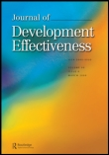
Journal of Development Effectiveness
Scope & Guideline
Bridging Disciplines to Elevate Development Effectiveness
Introduction
Aims and Scopes
- Impact Evaluation:
The journal focuses on rigorous impact evaluation methodologies, including randomized controlled trials, quasi-experimental designs, and mixed-methods approaches, to assess the effectiveness of development interventions. - Social Protection and Poverty Alleviation:
A significant emphasis is placed on studies related to social protection mechanisms, such as cash transfers and livelihood programs, aimed at alleviating poverty and improving living conditions in low- and middle-income countries. - Food Security and Nutrition:
Research on food security, nutrition interventions, and agricultural productivity is a core area, addressing the challenges of hunger and malnutrition in various contexts. - Education and Capacity Building:
The journal publishes work on educational interventions, vocational training, and capacity-building initiatives that aim to improve education quality and access, particularly for marginalized populations. - Community Engagement and Governance:
There is a focus on the role of community engagement and participatory governance in enhancing development outcomes, exploring how citizen involvement influences project success. - Ethics in Development Evaluations:
The journal highlights the importance of ethical considerations in conducting evaluations, ensuring that research practices uphold the dignity and rights of participants.
Trending and Emerging
- Artificial Intelligence and Machine Learning:
Recent publications emphasize the application of AI and machine learning in analyzing development data, showcasing innovative methodologies that enhance evidence generation and decision-making processes. - Conditional Cash Transfers and Financial Inclusion:
There is a growing interest in evaluating conditional cash transfer programs and their impact on financial inclusion, highlighting the intersection of social protection and economic empowerment. - Mixed-Methods Research:
A notable trend towards mixed-methods research is emerging, combining quantitative and qualitative approaches to provide a more comprehensive understanding of development impacts. - Community-Based Interventions:
There is an increasing focus on community-based approaches that empower local populations and leverage local knowledge, reflecting a paradigm shift towards participatory development. - Health and Nutrition Interventions:
Recent studies are increasingly addressing the nexus between health, nutrition, and development, recognizing the critical role of health outcomes in achieving broader development goals. - Ethics and Transparency in Evaluations:
There is a heightened emphasis on ethical considerations, research transparency, and reproducibility in evaluations, as researchers and policymakers seek to build trust and accountability in development practices.
Declining or Waning
- Traditional Economic Growth Models:
There has been a noticeable decrease in publications focused solely on traditional economic growth models without considering broader social impacts, as the journal increasingly emphasizes holistic approaches to development. - Sector-Specific Interventions without Integration:
Research solely dedicated to sector-specific interventions (such as isolated agricultural or health programs) appears to be waning, with more studies integrating multiple sectors to address complex development challenges. - Longitudinal Studies without Immediate Impact Assessment:
The journal has seen a decline in longitudinal studies that do not provide immediate impact assessments, as there is a growing demand for timely evidence that informs policy and practice. - Theoretical Frameworks without Empirical Evidence:
There is a reduced emphasis on theoretical discussions that lack empirical validation, as the journal prioritizes studies that combine theory with robust data to support practical applications. - Local Context-Specific Studies:
The frequency of highly localized studies that do not consider broader implications or comparisons across regions is diminishing, as the journal seeks to enhance the generalizability of findings.
Similar Journals

MILBANK QUARTERLY
Elevating Public Health Discourse with Innovative InsightsThe Milbank Quarterly is a preeminent scholarly journal published by Wiley that focuses on a range of vital issues in health policy and public health. With an impressive impact factor underscored by its Q1 rankings in both health policy and public health, the journal serves as an essential resource for researchers and professionals seeking to influence health systems and policies on a global scale. Since its establishment in 1986, The Milbank Quarterly has maintained a commitment to rigorous research and innovative analysis, and it continues to provide a platform for groundbreaking studies that address contemporary challenges in health care. Although it does not currently offer open access, the journal features a comprehensive review process that ensures the publication of high-quality articles aiming to inform policy decisions and elevate public health practices, confirming its status within the top ranks of its field.
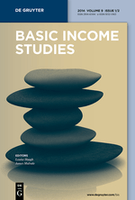
Basic Income Studies
Fostering Global Dialogue on Economic InclusionBasic Income Studies, published by Walter de Gruyter GmbH, serves as a vital platform for interdisciplinary dialogue and research in the domain of basic income, exploring its implications across economic, social, and policy-related dimensions. Established in 2006 and reflecting a commitment to innovation in social welfare theory, this journal has carved a niche within the Q3 category of Economics and Econometrics as of 2023, ranked #372 out of 716 journals in its field according to Scopus. With its emphasis on open access scholarship, researchers can disseminate their findings widely, fostering a global discussion among scholars, practitioners, and policymakers. The journal’s comprehensive scope aims to publish cutting-edge research that not only contributes to the academic discourse but also has practical implications for the design and implementation of basic income policies worldwide. Located in Berlin, Germany, Basic Income Studies represents a pivotal resource for anyone engaged in the evolving conversation surrounding economic equity and social justice.
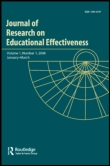
Journal of Research on Educational Effectiveness
Driving educational improvement with scholarly rigor.The Journal of Research on Educational Effectiveness, published by Routledge Journals, Taylor & Francis Ltd, stands as a leading voice in the field of education research, with an impressive impact factor reflective of its scholarly significance. Since its inception in 2008, this prestigious journal has provided a platform for innovative research that focuses on the efficacy of educational practices and interventions. With a Q1 ranking in Education and a commendable position within the top 75th percentile of Scopus rankings, it serves as a vital resource for researchers, educators, and policymakers committed to enhancing educational outcomes. The journal's rigorous peer-review process ensures high-quality publications that are accessible to a global audience, fostering collaboration and knowledge exchange in the pursuit of effective educational strategies. Engage with cutting-edge research and contribute to the ongoing dialogue shaping the future of education.

Canadian Journal of Program Evaluation
Transforming Insights into Impactful EvaluationsCanadian Journal of Program Evaluation, published by University of Toronto Press Inc, stands as a vital resource in the field of program evaluation, encompassing a diverse array of topics relevant to researchers, practitioners, and policymakers alike. With a focus on advancing knowledge and promoting best practices in evaluating public and private programs, this journal has gained recognition in the Library and Information Sciences category, achieving a commendable Q2 ranking in the 2023 evaluations, alongside a Scopus rank of #124 out of 280 within its domain. The journal is particularly noted for its commitment to enhancing the quality and effectiveness of evaluations through rigorous research and thoughtful analysis. By engaging with cutting-edge findings and case studies from 2005 to 2023, the Canadian Journal of Program Evaluation contributes significantly to the discourse around program development and assessment. Although it does not offer open access, researchers and practitioners are encouraged to utilize this premium publication to enrich their understanding and application of evaluation methodologies.

CANADIAN JOURNAL OF DIETETIC PRACTICE AND RESEARCH
Connecting Researchers and Practitioners in Nutrition ScienceWelcome to the Canadian Journal of Dietetic Practice and Research, a distinguished publication dedicated to advancing the field of nutrition and dietetics in Canada and beyond. Published by Dietitians Canada, this journal serves as a vital platform for researchers, practitioners, and students to share evidence-based practices, innovative research findings, and professional insights. With a trajectory spanning from 1996 to 2024, the journal focuses on multidisciplinary approaches in dietetic practice, contributing significantly to the discourse around health and nutrition. Currently ranked in the Q3 quartile for both Medicine (miscellaneous) and Nutrition and Dietetics, the journal regularly features articles that explore the nuances of dietary interventions, clinical practices, and public health strategies aimed at improving population health outcomes. With access options tailored to a diverse audience, including Open Access formats, this journal enhances the accessibility and dissemination of critical research. Whether you are a seasoned professional or an emerging scholar, the Canadian Journal of Dietetic Practice and Research is a crucial resource for those striving to make meaningful contributions to the field of dietetics.
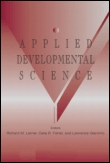
Applied Developmental Science
Illuminating the pathways of human development through empirical research.Applied Developmental Science is a leading academic journal dedicated to enhancing the understanding of human development across the lifespan. Published by Routledge Journals, Taylor & Francis Ltd, this esteemed journal stands out in its field with a remarkable impact factor and prestigious Q1 classification in Applied Psychology, Developmental and Educational Psychology, and Life-span and Life-course Studies, as of 2023. By focusing on empirical research and innovative theoretical perspectives, Applied Developmental Science serves as a vital resource for researchers, professionals, and students alike, fostering a deep understanding of developmental processes. The journal’s high rankings highlight its influence and commitment to advancing knowledge in developmental psychology. Although not an open-access publication, it provides invaluable insights for those engaged in developmental science, making it a cornerstone for academic inquiry and professional practice within the discipline.
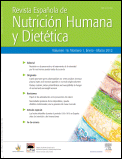
Revista Espanola de Nutricion Humana y Dietetica
Innovating dietary practices for public health.Revista Espanola de Nutricion Humana y Dietetica is a pivotal open-access journal dedicated to advancing the study of human nutrition and dietetics. Published by the ASOC ESPANOLA DIETISTAS NUTRICIONISTAS in Spain, this journal has been making significant contributions to the field since its inception in 2011. With an ISSN of 2173-1292 and an E-ISSN of 2174-5145, it provides researchers and practitioners with a valuable platform for disseminating innovative research, case studies, and reviews related to nutrition science. Although currently ranked Q4 in both Food Science and Nutrition and Dietetics categories (2023), the journal is committed to raising its academic profile by fostering high-quality publications that address contemporary issues in nutrition. Open access since 2012, it ensures that research is readily available to a global audience, thus promoting the exchange of knowledge and best practices. Emphasizing the importance of dietary interventions and public health nutrition, the journal encourages contributions that bridge theory and practical applications, appealing to a broad spectrum of professionals, researchers, and students within the field.
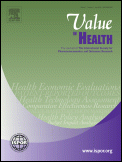
VALUE IN HEALTH
Transforming Insights into Impact for Global HealthVALUE IN HEALTH, published by Elsevier Science Inc, is a premier peer-reviewed journal in the fields of Health Policy, Medicine, and Public Health. With an impressive impact factor reflecting its respected standing, the journal has achieved a distinguished Q1 classification in multiple categories, placing it among the top publications in the health domain. Since its inception in 1998, this journal has been a vital platform for disseminating research that informs health policy and practice, impacting both clinical and public health decision-making. The journal’s Scopus rankings further underscore its global influence, with notable positions in Medicine and Public Health sectors. VALUE IN HEALTH is committed to fostering an environment where innovative research meets practical application, ultimately aiming to enhance health outcomes worldwide. Researchers, professionals, and students alike are encouraged to explore the wealth of knowledge contained within its pages.

Journal of Agricultural Education & Extension
Nurturing growth in agricultural education and community engagement.The Journal of Agricultural Education & Extension, published by Routledge Journals, Taylor & Francis Ltd, is a distinguished peer-reviewed journal that occupies a vital niche at the intersection of agricultural sciences and education. With an impressive impact factor underscoring its reputation - categorized as Q1 in Agricultural and Biological Sciences and Geography, Planning and Development, and Q2 in Education for 2023 - this journal attracts a diverse readership keen on advancing knowledge in agricultural education, extension practices, and sustainable development. The journal's rigorous articles, spanning from 2010 to 2024, not only address contemporary challenges in agriculture but also promote innovative teaching methodologies and research strategies. Researchers, professionals, and students alike benefit from its insightful contributions, making it an essential resource for those dedicated to enhancing agricultural education and fostering community engagement in the UK and beyond. Access options to the journal are available through institutional subscriptions, ensuring widespread reach and impact in the academic community.

Poverty & Public Policy
Connecting theory with practice in public policy.Poverty & Public Policy is an esteemed journal published by WILEY that focuses on the intersection of poverty issues and public policies aimed at alleviating social disparities and enhancing quality of life. With an ISSN of 1944-2858, this journal serves as a critical resource for researchers, policymakers, and practitioners in the fields of Cultural Studies, Sociology, and Political Science. Recognized for its academic rigor, it boasts a commendable Q1 ranking in Cultural Studies and a Q2 classification in Sociology and Political Science as per the 2023 quartiles. The journal is accessible to a diverse audience and aims to provide insights and analyses that foster a deeper understanding of poverty-related challenges and policy responses. Converging from 2009 to 2024, it continues to contribute to scholarly discourse and policy formation, making it an indispensable addition for anyone committed to addressing the complex issues surrounding poverty on a global scale.